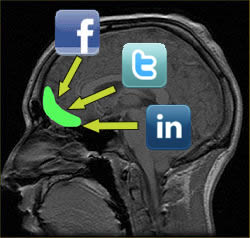Bigger Brain = Social Media Success
 Hiring a social media manager or a salesperson? Maybe you should have the finalists’ brains scanned in an fMRI.
Hiring a social media manager or a salesperson? Maybe you should have the finalists’ brains scanned in an fMRI.
A larger orbital prefrontal cortex, an area of the brain associated with decision-making and cognitive processing, has been shown to correlate with greater social skills, according to a study by a team of UK researchers. Among the scientists was Robin Dunbar, who pioneered the idea that the average human is limited to a social circle of about 150 people (see Your Brain’s Twitter Limit: 150 Real Friends), a constant now known as the Dunbar number.
The study looked at “intentionality,” summarized in the paper as, “the ability to explain and predict the behaviour of others by attributing to them intentions and mental states.” It’s a measure of social skill, and in this study the researchers gave subjects stories to read and then asked them about the mental states of various characters in the story:
The subject’s own mind state was defined as first order intentionality, and the mind state of each protagonist from the story included in a question added successive levels of intentionality. A 6th order intentionality question thus involved tracking the mind states of five individuals in the story, as well as the subject’s own mind state. [From Neuropsychologia – Orbital prefrontal cortex volume correlates with social cognitive competence
One oversimplified view is that a socially skilled person could correctly assess what Bill was thinking in a situation, but how Sally was interpreting Bill’s actions, etc.
Individual Differences
The study found that the subjects who demonstrated the highest levels of intentionality had larger orbital PFCs, as determined by fMRI scans. While one might assume that the volume of this region is more or less unchanging for an individual, the study didn’t look at whether changes could occur with extensive socialization or specific training. We do know that brain changes can be occur through learning processes, such as long hours of practicing the violin. This study, though, looked mainly at the evolutionary aspect, i.e., growth of this structure in humans appeared to be related to their increased level of social skills compared to other primates.
The orbital PFC isn’t the only brain area associated with social skills. As I described in The Twitter Spot in Your Brain, another study found that larger amygdalas correlated with more friends and more complex social networks.
Nature Tops Nurture?
I don’t really expect hiring managers to start scanning the brains of job candidates, but the study does confirm what we already know from experience: some people have inherently better social skills than others, and that training alone may not be enough to close this gap.

This is really cool!! However, I’m curious. Sometimes I find that the most successful social media/community manager types are actually quite awkward in real life situations. People who prefer to stay behind a computer, build relationships online, definitely have different personalities than those that like getting out there and meeting people. Thoughts?
I think that there can be a divide between face-to-face and virtual socialization, Meredith, but it appears that our brain capacity limits both varieties in much the same way. Duncan’s number, for example, has been demonstrated both in the real world and in social media. It’s not an absolute, of course.
Roger
Nature vs nurture is always an interesting debate. In my opinion, nurture always wins, and I think it does in this context as well. Some people may exhibit better social skills than others, but that could be due to a number of reasons such as public speaking training, family structure, confidence, intelligence etc.
I am naturally a more quite and reserved person. However, I have been through public speaking training etc etc and that has greatly helped my social and communication skills.
Awesome blog concept though! The brain is so fascinating!
I do believe training can do a lot, Aj. Some people might have great capacity for social reasoning, but be awkward speakers or networkers.
Roger
I knew it! My addiction to Hoot Suite directly stems from my huge noodle.
Amazing. I love learning about how the brain works and why people act the way they do in social settings.
I have two kids, raised the same, but very different. They have traits, personality quirks, habits, ideas, near identical to grandparents they spent very little time with. Things you would never think are “wired in” definitely are.
We spend a lifetime getting to know ourselves and learning how to work within those inheirited abilities and limitations. We do not spend a lifetime becoming who we are, though we like to believe we have that ability. Nature defines, nurture refines.
Well said, Dwee. It’s never nature OR nurture, it’s always nature AND nurture.
Roger
[…..training alone may not be enough to close this gap….]. Great opinion.
Most of the time, companies spend so much money to train their employees without effective results. Maybe this finding explains the reasons.
This is an interesting piece of information. It’s interesting to know how brains of different people work differently when it comes to socializing or establishing social relationships online.
Thanks.